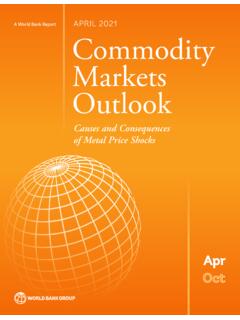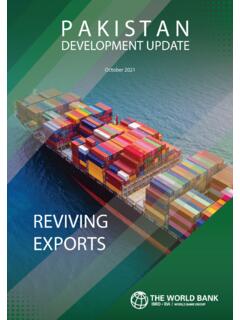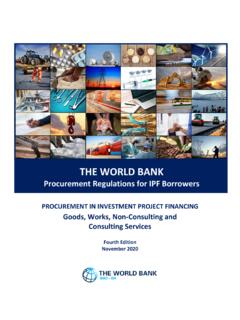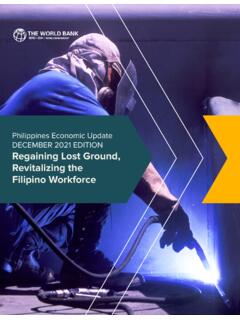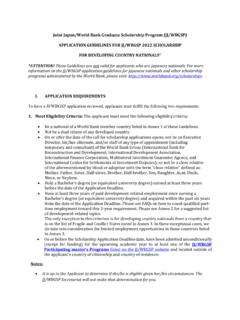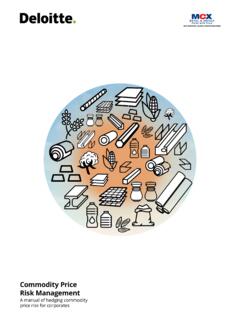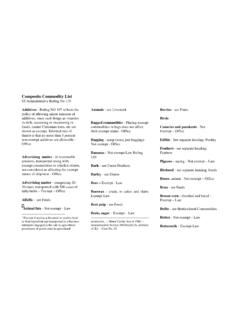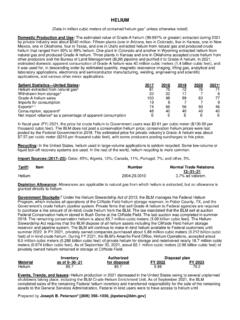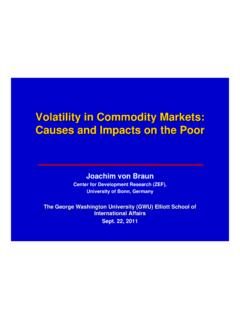Transcription of A Shock Like No Other: The Impact of COVID-19 on …
1 SPECIAL FOCUS. A Shock Like No other : The Impact of COVID-19 on commodity Markets C O M M O D I T Y M A R K E T S O U T LO O K | A P R I L 2 0 2 0 S P EC IAL FO CU S 7. A Shock Like No other : The Impact of COVID-19 on commodity Markets The outbreak of COVID-19 has been accompanied by widespread declines in global commodity prices. The pandemic represents a unique Shock that has a major Impact on both the demand and supply of commodities. Oil markets have been most affected, given the collapse in travel arising from mitigation measures, and have seen an unprecedented collapse in demand and steepest one-month decline in oil prices on record.
2 Metals prices have also fallen, albeit less than oil, while agricultural prices have been much less affected so far given their indirect relationship with economic activity. Over the short-term, in addition to weaker demand, disruptions to supply chains could cause dislocations in commodity markets, with food security a key concern. The ultimate Impact of the pandemic will depend on its severity and duration, but it is likely to have lasting implications. Changing consumer behavior could cause a structural shift in work patterns, reducing travel and demand for fuel.
3 An unwinding of complex global value chains may occur, which could reduce commodity demand. For policymakers in EMDEs, the plunge in oil prices provides an opportunity to eliminate energy subsidies. Introduction reduction in the volume of shipping as a result of shrinking global trade. As a result, the On March 19, the World Health Organization International Energy Agency expects global oil announced that COVID-19 was a global demand to decline almost 10 percent in 2020, pandemic the first pandemic since the 2009 more than twice as large as the next largest plunge outbreak of H1N1 (swine flu).
4 The number of in 1980 (IEA 2020; Figure ). infections and deaths continue to rise sharply across the world, and the outbreak presents a The prospects for commodity prices were already major Shock to an already fragile global outlook. muted when the pandemic hit. Rising trade Prior to the outbreak, global growth was expected tensions and slowing growth in China were to rise marginally to percent in 2020 from a adversely affecting demand, and most commodities post-crisis low of percent in 2019 (World were in ample supply. oil production reached Bank 2020a). Consensus estimates of growth now record levels in 2019, while most food commodity suggest deep recessions are likely in many markets experienced near-record high production advanced economies, while growth in emerging and stock levels.
5 Market and developing economies (EMDEs) is expected to slow sharply. Weaker growth will also While the current pandemic has few precedents in result in reduced demand for commodities. history, past episodes of major economic recessions or disruptions, as well as previous major disease The direct Impact of COVID-19 and measures outbreaks, can provide valuable insights into how taken to contain it have had substantial impacts commodity markets may be affected. For example, on commodity markets and supply chains. Prices the terrorist attacks on the United States on of most major commodities have fallen since September 11, 2001, led to widespread travel January, led by oil which experienced its largest disruptions and reduced demand for oil.
6 Past one-month fall on record in March (Figure ; outbreaks of disease have had substantial localized Figure ). While mitigation measures to impacts, particularly on agricultural markets. Past control the spread of COVID-19 are essential, global recessions have been accompanied by sharp they have caused severe economic dislocations and declines in industrial commodity demand. a sharp reduction in travel. For example, passenger journeys in China in March fell by three- The consequences of COVID-19 are large and fifths compared to their normal level, while likely to persist, with widely varying impacts on in- subway journeys in New York City have fallen by dividual commodities.
7 Against this backdrop, this one-third (Figure ). There has also been a Focus examines the implications of COVID-19 for 8 S P EC IAL FO CU S C O M M O D I T Y M A R K E T S O U T LO O K | A P R I L 2 0 2 0. FIGURE The Impact of COVID-19 on commodity What has been the Impact thus markets far on commodity markets? The outbreak of COVID-19 has had a substantial Impact on commodity prices, with declines in most commodities, particularly crude oil. Natural rubber and platinum (both used extensively in the production of transport COVID-19 unleashed a unique combination of equipment) also experienced large price declines.
8 Oil prices have declined shocks to commodity markets, impacting both by two-thirds since January due to the unprecedented combination of a demand and supply simultaneously. Mitigation major demand and supply Shock . On the demand side, COVID-19 . containment measures have sharply reduced travel, and therefore oil measures, while essential, disrupt both demand demand. Oil demand is forecast to fall by almost 10 percent in 2020, more and supply of commodities. The unfolding than twice as large as the previous record. economic recession presents a further major Shock to demand.
9 The combination of these demand A. commodity price changes since B. Brent crude oil prices January 20. and supply shocks manifest themselves through a variety of channels, with varying impacts on different commodities. Reduced energy demand for travel. The shutdown of travel has resulted in a substantial fall in demand for fuel for transport, which accounts for two-thirds of global oil demand. Many countries have implemented wide-ranging travel bans and stay-at-home orders, sharply reducing C. Changes in transport demand, D. Oil demand plunges travel. Lower demand and prices for oil also March 2020 vs.
10 March 2019. reduces the price of crops used for biofuels, such as corn and soybean oil. Lower demand during economic downturn. The global recession is resulting in weaker commodity demand. Unlike demand for agricultural goods, demand for energy and metals is strongly affected by a slowdown in economic activity given its higher income elasticity (Baffes, Kabundi, and Source: Bloomberg, BP Statistical Review; International Energy Agency; Metropolitan Transportation Nagle 2020). Authority, WIND, World Bank. A. Change in commodity price since January 20, the date of the first confirmed human-to-human transmission.
